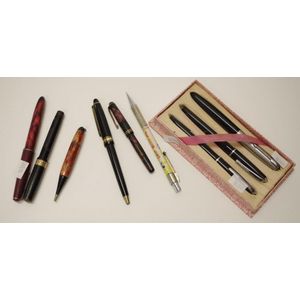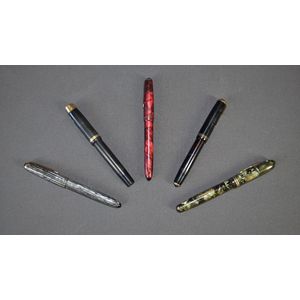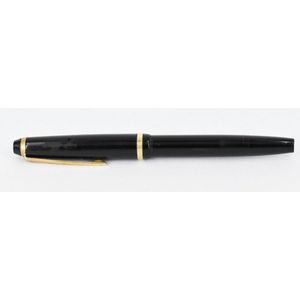
Onoto Gold Filled Set: Pencil and Fountain Pen
A vintage Onoto gold filled propelling pencil together with a matching fountain pen, length 11-12 cm

Onoto 9ct Gold Fountain Pen for Hugh Dennis Macrossan
Onoto, 9ct gold fountain pen engraved for Hugh Dennis Macrossan (1881?1940), in a fine ribbed finish, with a pen clip and a Delarue Onoto pen nib, engraved H.D. Macrossan 20.2.23, length approximately 148 mm, accompanied by an Onoto fitted box, the…

Onoto Fountain Pen: A Piece of History
DeLa Rue fountain pen Sold under the brand name 'Onoto'. Assayed in London 1912 this 9ct yellow gold fountain pen which Once belong to the Honourable Hugh Macrossan Deputy Governor of the state of Queensland 1935- 1936 and chief justice od the supreme…

Vintage Fountain Pens and Biros Collection
Collection of vintage fountain pens and biros including Onoto, E Faber, and Swan

Onoto 18ct Gold Strapped Fountain Pen by De La Rue
Onoto 18ct gold Strapped fountain pen, by de La Rue & Co. Ltd, London

Vintage Pen Collection: Ero, Parker, Sheaffer, Onoto, and More
Collection of various vintage pens including Ero, Parker, Sheaffer, Onoto, etc. 9 in total

1922 London Onoto Fountain Pen in Original Box
A 9ct gold Onoto fountain pen, with 14ct gold nib, in original box, London 1922.

Vintage Fountain Pen Collection with Onoto Set
Collection vintage fountain pens a total of approximately 12 various fountain pens, and ballpoint pens, including boxed set Onoto fountain pen and propelling pencil.

Vintage Onoto Junior Pen with 14k Gold Nib & Box
A vintage Fontain pen, 'The Onoto Junior Pen' by house of de La Rue, great Britain, with 14 carat gold nib. Length 11 cm. in original box.

Vintage Onoto Fountain Pen with Gold Nib and Croxley Pen
Vintage black Onoto fountain pen with 14ct gold nib, together with 'The Croxley Pen', (a/f)

Vintage Fountain Pen Set with Pencil
Onoto no.14 fountain pen & 2 others, comprising of a the Conway Stewart (as inspected) and a Platignum pencil

Marbled Onoto 'The Pen' Fountain Pen by De La Rue
Vintage Onoto 'The Pen' fountain pen, De La Rue & Co. Ltd London, with marbled finish

Assorted Fountain Pens: Conklin, Onoto, Parker, Melbi, Onoto 22
Five various fountain Pens. Conklin; Onoto; Parker Vacumatic; Melbi, 14ct. Nib; and Onoto 22, with grey barrel

Luxury Fountain Pen Collection
Four various fountain pens. Sterling silver Sheaffer; Onoto 9ct banded vulcanite; Osmonoid sterling silver; and Swan 2C, gilt banded vulcanite




 Loading more...
Loading more...